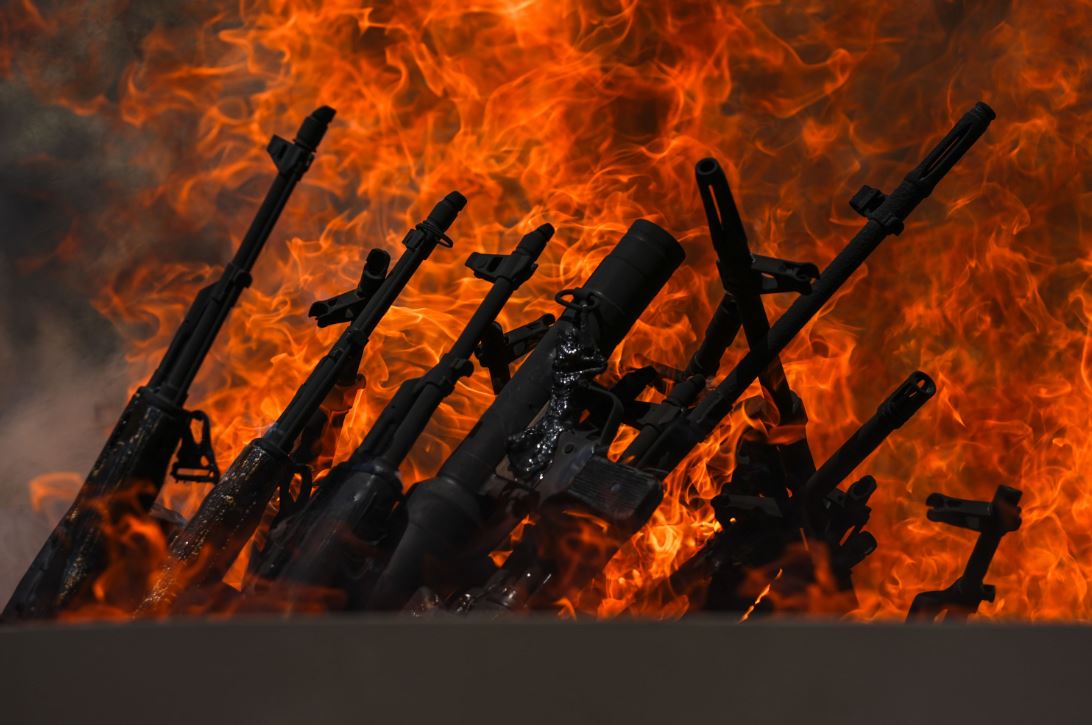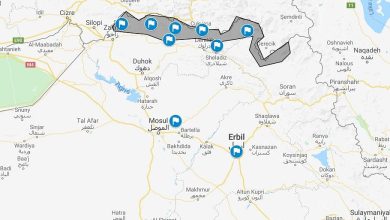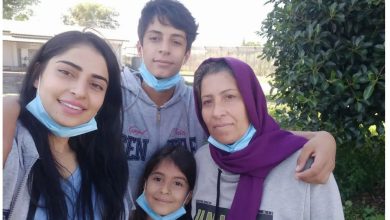What was publicized as the PKK’s arms burning in Surdash is, in reality, the belated culmination of decades of missed opportunities and ideological stubbornness. Now that the group has, in a way, surrendered, it’s more crucial than ever to analyze the true dimensions of this event to understand the depth of these transformations
Hooshang Sheykhi – Researcher of Middle East Issues
The burning of thirty PKK weapons at the mouth of Jasanah Cave in the Surdash region of Sulaymaniyah on Friday, July 11, 2025, although a symbolic act in response to Öcalan’s call, conveyed messages to all Kurdish groups in the region, regardless of the symbolism of the combination of attire, weapons, the 15 women and 15 men involved, or the leadership of Bese Hozat, co-chair of the KCK (the PKK’s umbrella organization), in this small group’s arms burning.
Firstly, the name of Jasanah Cave, first mentioned in the Kurdish armed movement, dates back to the era of Sheikh Mahmud Barzanji, his armed struggle, and the publication of the “Bang-e Haq” newspaper in 1923. This time, however, Jasanah Cave, after 102 years, served to illustrate the dead end of the ideology of establishing a Kurdish state and the end of the armed struggle strategy. Abdullah Öcalan, who in his first public video in 26 years explicitly shifted his language and address from “Kurdish guerrillas” to “communalist comrades,” now refers to a specific type of communalism and democratization of society. He admits he no longer believes in arms, stating that democratic participation is the only way forward. In “Sociology of Freedom,” over a decade ago, he explicitly stated that the era of establishing nation-states had passed. In re-explaining and redefining nationalism, he shifted it, in his words, from the macro to the micro level, with the condition of not clashing with other nationalisms within the framework of a single state and country. Now, he is pragmatically working to put these ideas into practice.
Secondly, the Surdash region, located 50 kilometers from Sulaymaniyah city and considered a suburb of Dukan, has gained prominence in the last two years due to the Iran-Iraq security agreement and the relocation of anti-Iran armed groups and parties to the Surdash camp. This time, the region’s name resonates with the disarmament of the PKK, further highlighting the futility of the Kurdish armed movement.
Thirdly, the disarmament of the PKK, as the ideologically and logistically strongest Kurdish group, held a more significant message than simply acting on Öcalan’s call: that armed struggle, due to historical missed opportunities, leads to nothing but the burning of weapons. For decades, Kurdish romanticism, fueled by armed struggle, claimed countless lives and squandered various resources. Now, in 2025, Abdullah Öcalan views the ultimate goal of his movement as democratizing society and does not hide the flawed and futile nature of the Kurdish state idea. In his explanation of “new communalism,” he even seeks to utilize all social capacities that he previously rejected. For example, in the new version of his thought, he aims to draw upon everything from family to tribe, religious circles, and municipalities to explain the concept of communalism and the democratization of society. Meanwhile, those whose slogan was “arms are honor,” for whom weapons were not a method, a tactic, or even a strategy but their very honor, now gaze bewildered at the burning embodiment of their honor.
Fourthly, the PKK disarmament project, initiated by Devlet Bahçeli’s invitation and Abdullah Öcalan’s command, explicitly encompasses all top-down, bottom-up, and parallel structures of the PKK stemming from “Apoist” ideology. Specifically, statements from the AK Party spokesperson, the Turkish Foreign Minister, and President Erdoğan’s Saturday remarks indicate that all PKK groups must be disarmed and dissolved. Naturally, in addition to the PKK itself and its Turkey-focused branches, the limitation and eventual disarmament of the PKK’s Syrian branch is a priority for the Turkish government. This aligns with the “National Pact” that both the Turkish government envisions within the framework of the Ottoman dream and that PKK leaders recently endorsed, making northern Syria and northern Iraq crucial for Ankara. However, PJAK, as one of the PKK’s offshoots, which in the organizational division of labor has always been responsible for interpreting Apoist ideology for the Kurds of Iran, is now one of the recipients of the idea of the futility of armed struggle, the notion of state establishment, and even moving beyond cultural solutions, autonomy, federalism, and other wishful forms of state-seeking.
According to Öcalan, this group, as his “communalist comrades,” “must” (this “must” was stated by Öcalan) act democratically, with no place for violence and weapons. However, if PJAK does not adhere to these explicit statements from the PKK leader, one point comes to mind: that the said group will become a gathering of disgruntled elements from the PKK disarmament project. Given PJAK’s co-chair Amir Karimi’s recent interview with the BBC, denying any enmity with Turkey, it should not be surprising if PJAK increasingly becomes a proxy group for Iran’s rivals and adversaries. And considering the bankruptcy of the Kurdish armed movement idea within the mother party, the PKK, at this juncture, the focus will indeed shift to PJAK’s proxy function for the security objectives of other rival and hostile regional and international actors against Iran.
Overall, regardless of Öcalan’s intellectual evolution, his references to regional developments, examination of on-the-ground events, and careful consideration of regional political and security trends suggest that it’s unlikely the “deep state” in Turkey would end this animosity solely based on good intentions to cease conflict with the PKK and potentially grant concessions to Kurds in the Republic of Turkey. Bringing the military into coup-prone Turkey, reducing the army’s engagements, and introducing new political forces amidst social divisions would only exacerbate political polarization and security threats in Turkey.
At the same time, with the disarmament and dissolution of the PKK, Turkey effectively loses its pretext for presence and occupation of northern Syrian and northern Iraqi territories, resulting in a loss of leverage that would be detrimental to Ankara’s expansionist policy. Thus, at this level of analysis, the sudden and complete removal of the PKK variable is not without cost for Turkey, unless more vital interests of the Turkish government and another level of analysis are at play.
Therefore, viewing the project of calling for the PKK’s disarmament and strategically analyzing Turkey’s decision has various aspects. These include disarmament as a vital measure serving the security of Turkey’s “Development Road” corridor. This route starts from the United Arab Emirates, enters Turkey via Iraq, and ultimately ends in Europe. This route is one of Turkey’s attempts to avoid falling behind in economic and strategic corridors aligned with the West, as it aims to replace the India-Middle East-Europe Economic Corridor (IMEC) due to crises after Operation Al-Aqsa Flood and ambiguities in the IMEC route.
Naturally, vital interests are at stake, which is why Erdoğan, this time speaking through the symbol of the deep state, Bahçeli, calls for an end to terrorism. So far, apart from the attack on Turkish Aerospace Industries (TUSAŞ) headquarters, as one of Turkey’s deep state institutions, no other sabotage has occurred in the course of this invitation, and the Erdoğan-Bahçeli alliance has managed to align the hard core of power with itself.
Given the macro-level political and security trends in the region and Öcalan’s references to regional developments in his video message, and even his claim to offer an antidote for the “Israel-Palestine” dichotomy in his leaked text titled “A Perspective for the 12th PKK Congress” under the rubric of regional democratic confederalism, while announcing the dead end of the armed movement and the Kurdish state idea, it can be said that “a security deal involving Öcalan and the Turkish deep state is underway, outlining its vision across the region with an eye towards reviving the Ottoman National Pact and serving Ankara. In subsequent stages, we should expect efforts to change the region’s map and geopolitics in this regard, with Ankara as the orchestrator and the participation of proxy forces in Turkey’s periphery.”
Regardless of the scenarios facing Turkey and the extent of their success in creating various corridors and realizing the National Pact, regarding the PKK’s arms burning, it is quite clear: just as Sheikh Mahmud Barzanji in 1923 believed he had the power to be present and influential in the “Great Game” and ultimately hid in Jasanah Cave to escape the fire of British airplanes, today, some followers of the Imrali prisoner, in that same Jasanah Cave, acknowledging the failure of the Kurdish state idea and armed movement, and amidst their own confusion and their leader’s fantasy of participating in the Great Game, symbolically burned weapons, having wasted 47 years of opportunity.
However, a review of the positions of other PKK affiliates indicates that PJAK’s function apparently has not yet ended. In the intra-group division of labor, this group is still preserved as a vehicle for political romanticism and proxy play, so that by sacrificing its members and wasting opportunities in the usual style of Kurdish movements, the interests of non-Kurdish actors at the regional and international levels are served, and the ultimate cost is borne by the Kurdish community, especially the Kurds of Iran. Meanwhile, it is rational and optimal that not only PJAK, which is now facing an ideological and strategic dead end from its leaders on a regional scale, should dissolve and disarm itself, but also other armed Kurdish groups should consign their 20th-century Kalashnikovs to the dark history of their movements, choose a new path of non-violent existence within civil society, and contribute to the development of Kurdish-inhabited areas without disrupting the lives of ordinary people.
Because sooner or later, burned or unburned weapons belong in the Amna Suraka Museum or Jasanah Cave, and the current era no longer tolerates such romantic guerrilla play with the fantasy of participating in the Great Game.






